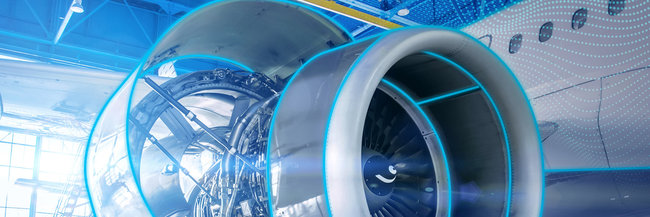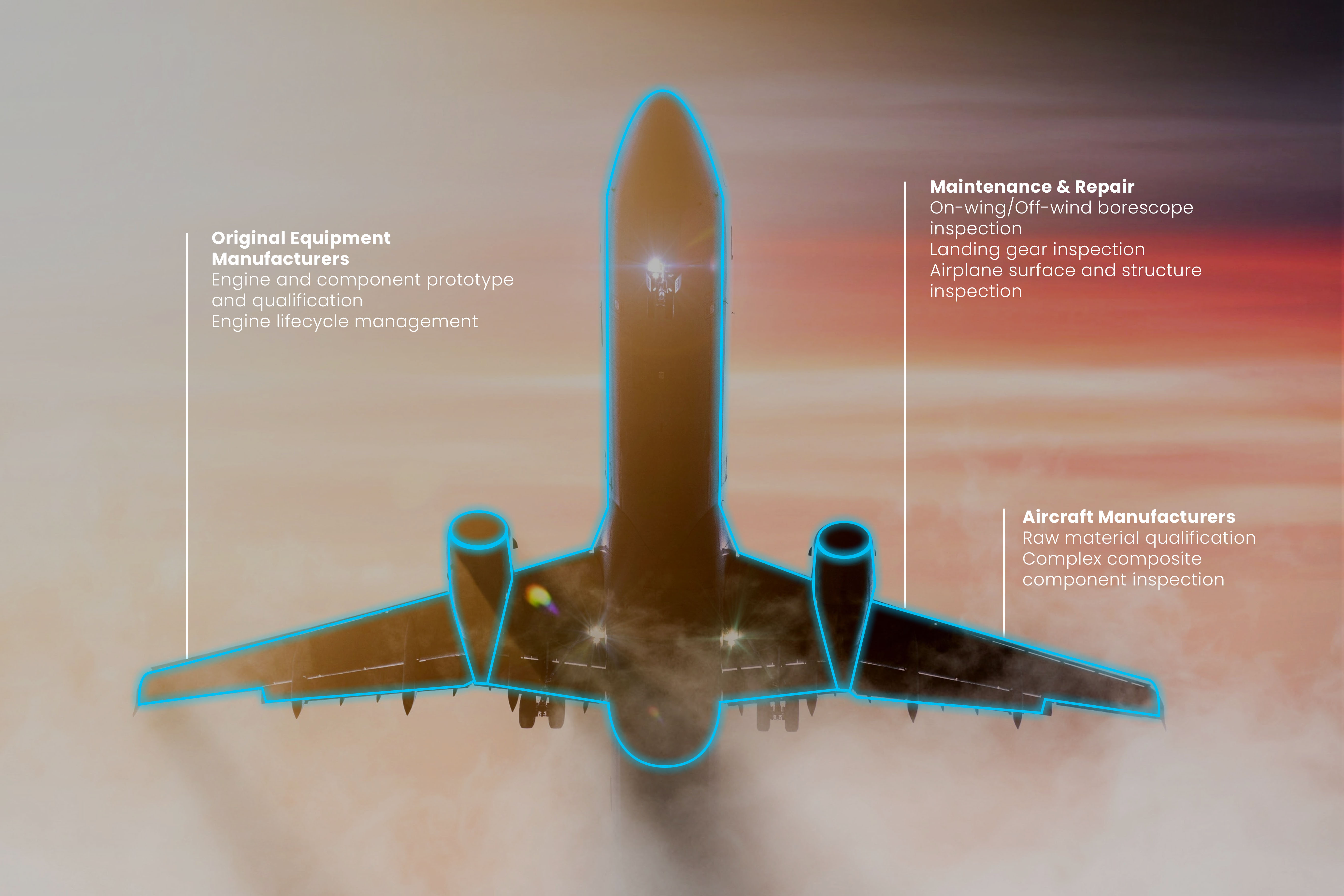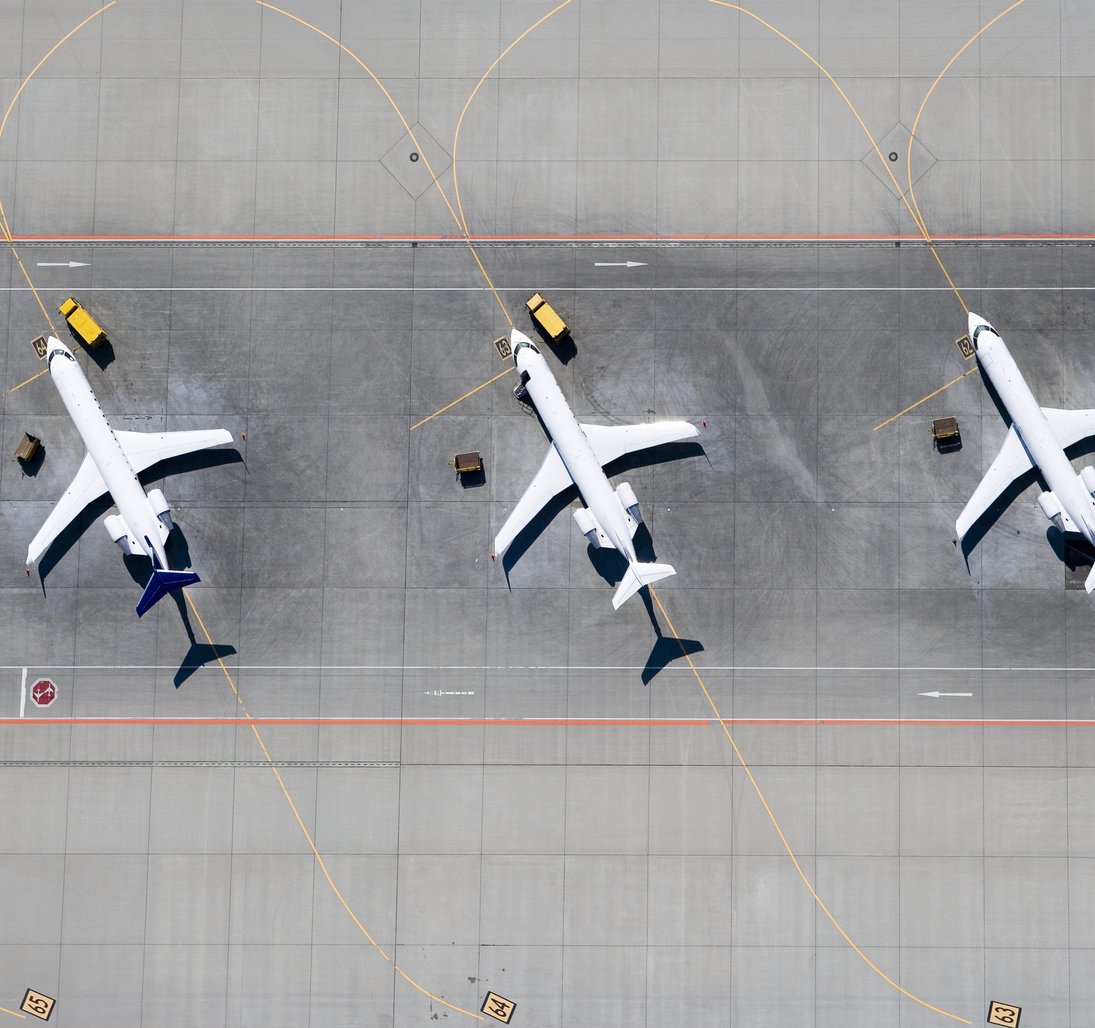Aerospace non destructive testing inspection solutions
Tightening compliance regulations in the aerospace industry are making precise inspections more vital than ever. At the same time, the pressure to reduce operating costs is intense. Trusted by the aviation and space industries for over 100 years to inspect everything from plane motors to rocket components, Waygate Technologies has the smart, productive and lean inspection solutions aerospace needs to meet these dual challenges in both manufacturing and maintenance.

Meet strict requirements and reduce human factor in manufacturing and maintenance

Changing to new fuels (hydrogen) and electrification will bring additional risks, defects, and failures modes.

The use of additive manufacturing and composite material to allow new geometries, also creates new challenges during testing and inspection.

Highly regulated industries with complex supplier and service agreements... Meticoulous selection, purchase, storage and spare parts management system – translate into waste.

Regulatory compliance and funding process design for redundancy, compliance, safety, operation, requirements ... not speed.
We deliver smart, productive, and lean inspection solutions for the aerospace industry
Aerospace NDT solutions made for your industry challenges

Today’s manufacturers are creating more complex parts than ever before — making inspections more challenging. Our industrial non-destructive testing solutions give manufacturers the ability to inspect and measure these complicated components and assemblies at the speed of production, so innovation can keep marching forward.

Smart, productive, and lean inspection solutions for the aerospace industry

Forged and cast metallic parts are used extensively in a variety of critical applications in nearly every industrial segment. We have been helping customers improve cast parts inspection accuracy and repeatability with advanced industrial radiography solutions for decades.

Composite use in aircraft has dramatically increased over the past several years, Our composite inspection systems are designed specifically with two things in mind – find defects that could lead to part failures and do so at very high throughput rates to keep up with industry need.

When time is your most valuable asset, we want to help you make the most of it. Our InspectionWorks Software Platform helps you transform inspections from a necessary cost to a critical flow of data enabling better product design and optimization.

Innovative maintenance, repair, and overhaul solutions optimize engine availability and reduce costs.

A long term strategy which sets out the collective approach of aviation to tackling the challenge of ensuring a cleaner, quieter, smarter future for the industry.

Fully examine and measure parts during the turbine blade manufacturing production process, check for internal defects in complex 3D printed parts in real time, and get faster visual inspections with HD image quality so you never miss a defect.
Get in touch with one of our Waygate Technologies subject matter experts.
Why choose Waygate Technologies
Application Across the Lifecycle
From initial material selection and manufacturing to ongoing in-service inspections and maintenance, our ndt solutions are embedded at every stage of the aerospace lifecycle. We ensure that every component meets rigorous safety and reliability standards—from production to final service.
Meeting Safety Requirements
In aerospace, safety is not optional. NDT is vital for early defect detection, preventing catastrophic failures, and maintaining compliance with strict industry standards. Our advanced testing methods help reduce downtime, optimize performance, and safeguard both passengers and assets.
Innovation in Inspection Technology
Advancements in AI, digital radiography, and ultrasonic testing are transforming aerospace NDT, enhancing inspection accuracy and efficiency. With AI-driven analytics, real-time defect detection, and data-driven predictive maintenance, Waygate Technologies ensures that aerospace manufacturers and MRO providers stay ahead of emerging safety, compliance, and performance challenges.
The Future of Aerospace NDT: AI-Powered Defect Detection with Waygate Technologies
In collaboration with AI for borescope inspection expert – Aiir Innovations – Waygate Technologies’ Aiir Edge Cold & Hot Analytics brings advanced artificial intelligence (AI) to borescope inspections, enabling real-time defect detection for turbine engines and aerofoil surfaces. This cutting-edge solution enhances inspection accuracy, speeds up defect identification, and reduces aircraft downtime, ensuring optimal maintenance efficiency.
- Real-Time Defect Recognition – AI-assisted defect recognition (ADR) instantly highlights cracks, missing material, and burned areas.
- Offline AI Capabilities – Runs directly on Mentor Visual iQ and iQ+ borescopes, eliminating the need for cloud connectivity.
- Enhanced Detection Accuracy – Trained on thousands of hours of borescope footage, improving reliability across 30+ engine configurations.
- Optimized for Aerospace Engines – Supports compressor, turbine, and combustor inspections for engines like CF6, CFM56, GE90, Trent 700, and more.
Aiir Edge ensures faster, more objective, and highly accurate inspections, giving maintenance teams the power of AI at their fingertips.
Non-Destructive Testing (NDT) is used in the aerospace industry at various stages of an aircraft's lifecycle to ensure safety, performance, and compliance with regulatory standards. It is applied in the following key situations:
During Manufacturing: NDT is used to inspect raw materials, components, and assemblies to ensure they meet strict aerospace quality and safety standards before entering service.
Routine Maintenance & Inspections: Aircraft undergo scheduled NDT checks to detect fatigue, corrosion, or hidden defects in critical areas such as fuselage, wings, landing gear, and engines.
After Repairs & Modifications: Following repairs, NDT verifies the integrity of welds, fasteners, and bonded structures to ensure they meet safety requirements.
During Overhaul & Life Extension Programs: As aircraft age, NDT helps assess structural health and determine whether components can continue to be used or require replacement.
After Unexpected Events: In cases of hard landings, lightning strikes, bird strikes, or extreme turbulence, NDT is used to inspect for potential damage that may not be visible externally.
By using NDT at these critical points, the aerospace industry ensures the longevity, reliability, and safety of aircraft while preventing costly failures and reducing downtime.
Non-Destructive Testing (NDT) plays a crucial role in the aerospace industry by ensuring the safety, reliability, and performance of aircraft components without causing damage. It is used in various stages of aircraft manufacturing, maintenance, and repair to detect defects, fatigue, corrosion, and structural integrity issues.
Key applications of NDT in aerospace include:
Aircraft Maintenance & Inspection: Regular NDT checks help detect cracks, corrosion, and other defects in critical components such as fuselage, wings, landing gear, and engine parts.
Manufacturing Quality Control: NDT ensures that newly manufactured parts meet strict aerospace standards before they are assembled.
Structural Health Monitoring: Continuous or periodic inspections help assess the long-term condition of aircraft structures to prevent potential failures.
Weld & Bond Testing: NDT evaluates the quality of welds, rivets, and composite bonds to ensure structural integrity.
Detection of Hidden Defects: Techniques like ultrasonic and radiographic testing identify internal flaws that are not visible to the naked eye.
By using NDT methods such as ultrasonic, radiographic, eddy current, liquid penetrant, and magnetic particle testing, the aerospace industry ensures high safety standards, minimizes downtime, and extends the lifespan of aircraft.
The aerospace industry relies on Non-Destructive Testing (NDT) methods to inspect materials and components without causing damage. The most common NDT methods used in aerospace include:
Ultrasonic Testing (UT): Uses high-frequency sound waves to detect internal defects in materials.
Radiographic Testing (RT): Employs X-rays or gamma rays to inspect internal structures for cracks or voids.
Magnetic Particle Testing (MT): Detects surface and near-surface flaws in ferromagnetic materials using magnetic fields and iron particles.
Eddy Current Testing (ET): Uses electromagnetic fields to identify cracks, corrosion, and conductivity changes in conductive materials.
Liquid Penetrant Testing (PT): Applies a dye to the surface to reveal cracks or defects in non-porous materials.
Visual Inspection (VI): A fundamental method that includes direct observation or the use of tools like borescopes to assess surface conditions.
These NDT methods ensure the safety, reliability, and longevity of aerospace components without compromising their integrity.







